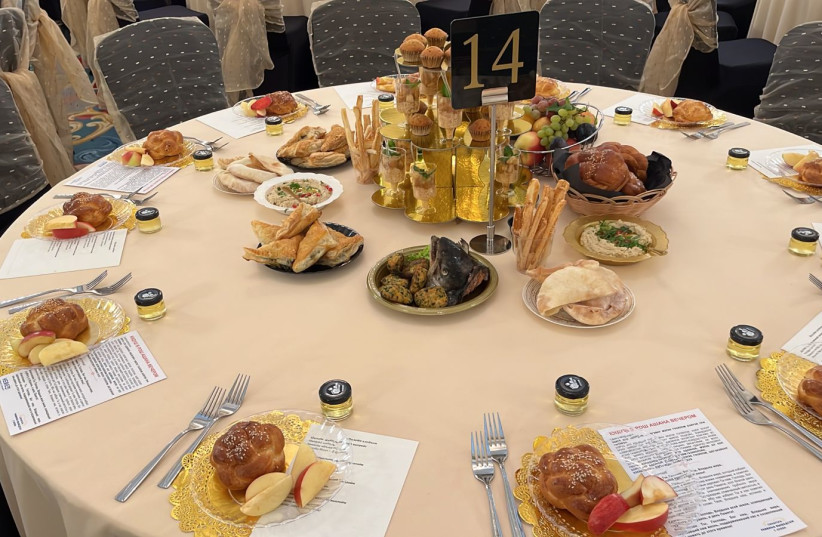Born in 2016, Butt Mitzvah (an obviously hilarious play on bar/bat mitzvah) is an LGBTQ+ Jewish club night. Hosting bi-annual queer parties to celebrate Jewish festivals, it provides a safe, and perhaps most importantly, joyful space for LGBTQ+ Jews and our allies to celebrate the duality in our identities.
In a 2016 Time Out article, the organizer reflected, “I am gay and have a strong Jewish identity. I wanted to bring both together. Also, I really wanted to capture the incredibly camp and joyous elements of a bar mitzvah and bring people together for something incredibly inclusive.”
It is the issue of duality that often stumps Jews in the West. Through no fault of our own, usually due to coercion and Jew-hatred that emanates from the non-Jewish world, we struggle with integrating into wider society while proudly maintaining our Jewish identities. Due to the demands of the wider world, we are forced to choose. And we often make the choice to diminish our Jewishness, in order to more easily navigate the world.
We shouldn’t blame ourselves for making this choice; instead, we should place the blame on the non-Jewish world for forcing us to choose. This represents the Broken Mirror of Jewish Identity, that I identified in my latest book, Reclaiming our Story: The Pursuit of Jewish Pride. It never results in an accurate reflection of authentic and proud Jewishness.
And that is why Butt-Mitzvah was so incredibly refreshing. On September 9, 2023 (the hottest day of the year), at the Troxy in East London, hundreds of queer Jews and our allies (both non-Jewish and heterosexual) showed up to celebrate Rosh Hashanah and the Jewish new year of 5784.

Not wanting to miss a moment, I arrived early with my partner, Gary, and two friends Thibaut and Karen, and immediately we were greeted with Jewish delicacies: pre-honeyed apples and bagels. We saw Jews dressed up as jars of honey and apples, blowing mini plastic shofars. After getting a drink, we cast our eyes across a massive dance room with huge screens showing scenes of Jews dancing while late ‘90s/early ‘00s pop music blared.
After years living in Hong Kong, this was my first proper, Butt-Mitzvah party. The first I attended was in July, co-hosted by Miznon, the incredible Israeli restaurant in Soho. While that party was exhilarating, it was just an appetizer that made me hungry for the real deal, and these first impressions told me everything I needed to know about it.
Celebrating together
AS THE room filled with party-goers, with many of the men wearing Kippot and not much else, the party got into full swing. Ash-Kenazi, a well-known North London Jewish drag queen, sang a live rendition of “Avinu Malkeinu.” She then launched into a strip tease to Sam Smith’s “Unholy,” and the crowd went wild. One couldn’t imagine two more different songs.
“Avinu Malkeinu,” the prayer recited during Jewish services during the Ten Days of Repentance, from Rosh Hashanah through to Yom Kippur, is noted in the Talmud. Meanwhile, “Unholy” is a 2022 smash-hit by non-binary artist, Sam Smith. But this performance perfectly encapsulated the evening. We were there as a gay Jewish collective to respectfully honor both aspects of our identity authentically. We were not going to choose.
While some in both communities may balk at this, they are entitled to their opinions. Nonetheless, this was truly extraordinary. On stage, in a boiling room in East London, Ash-Kenazi achieved something that generations of Jews before her had aspired to but failed. With the help of pyrotechnics, she paid homage to our indigeneity and our ancient civilization.
She seamlessly blended these timeless aspects with modernity and harmonized them with her other identities. Later in the night, led by Shir Jewish music, “London’s Favorite Jewish Party Band,” we celebrated to Jewish and Israeli music as we danced the hora and drank our vodka sodas.
We raved to “Moshiach” by Mordechai Ben David and “Tel Aviv” by Omer Adam. As the night wore on, we partied to the greatest hits by our favorite pop divas, including the official gay Jewish King, Troye Sivan, and traditional tunes like “Shalom Aleichem,” “Od Yavo Shalom Aleinu,” and “Hava Nagila.” The atmosphere was electric.
Dancing my face off for four hours at Butt-Mitzvah was an exhausting sweat-fest, but it left me feeling invigorated and inspired. This small collective of inspiring Jewish and LGBTQ+ leaders had managed to do something extraordinary. Led by a troop of energetic dancers and performers on stage, they gave hundreds of queer Jews an opportunity to feel joy and pride in both their Jewish and LGBTQ+ identities.
They reminded us that we don’t have to choose. We do not need to make ourselves acceptable because we are acceptable just as we are. This is a lesson that is relevant to all Jews. It’s why Jews deserve, as much as any group, a stand-alone distinct pride movement that educates, inspires, and empowers us.
At midnight, as we mimicked Western New Year and counted down to 5784 (a week early), hundreds of LGBTQ+ Jews and our allies yelled “Shanah Tovah!” at the top of their lungs. It was both hilarious and profound at the same time. This was the embodiment of Jewish joy. This was the manifestation of Jewish strength. This was the testament to Jewish continuity, and this was an expression of Jewish Pride.
Chag Sameach!
The writer is the founder of the modern Jewish Pride movement, an educator, and the author of Jewish Pride: Rebuilding a People. His new book, Reclaiming Our Story: The Pursuit of Jewish Pride, is now available.
